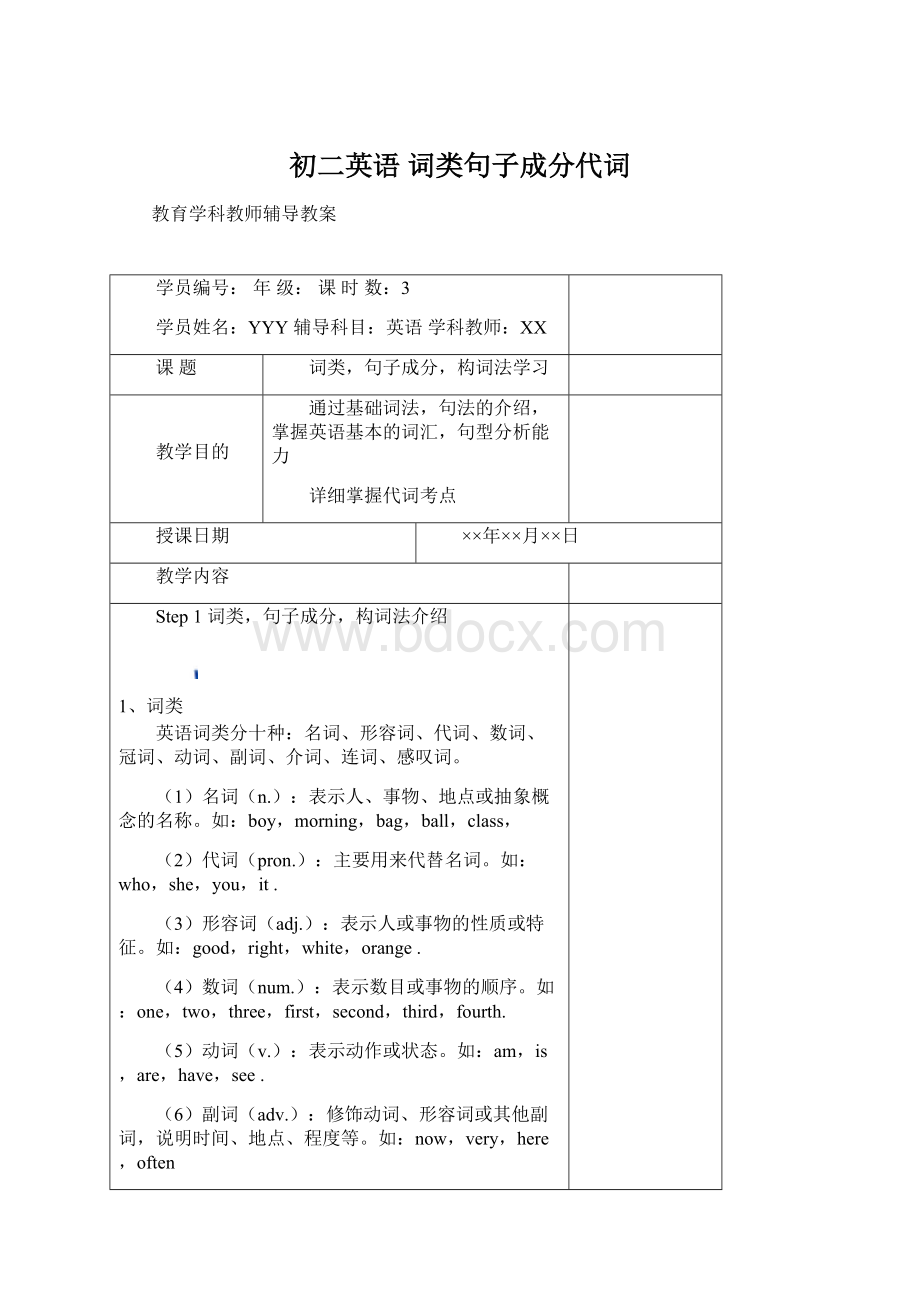 初二英语 词类句子成分代词Word文档格式.docx
初二英语 词类句子成分代词Word文档格式.docx
- 文档编号:21137849
- 上传时间:2023-01-27
- 格式:DOCX
- 页数:18
- 大小:57.78KB
初二英语 词类句子成分代词Word文档格式.docx
《初二英语 词类句子成分代词Word文档格式.docx》由会员分享,可在线阅读,更多相关《初二英语 词类句子成分代词Word文档格式.docx(18页珍藏版)》请在冰豆网上搜索。

one,two,three,first,second,third,fourth.
(5)动词(v.):
表示动作或状态。
am,is,are,have,see.
(6)副词(adv.):
修饰动词、形容词或其他副词,说明时间、地点、程度等。
now,very,here,often
(7)冠词(art.):
用在名词前,帮助说明名词。
a,an,the.
(8)介词(prep.):
表示它后面的名词或代词与其他句子成分的关系。
如in,on,from,above,.
(9)连词(conj.):
用来连接词、短语或句子。
如and,but,before.
(10)感叹词(interj.):
表示喜、怒、哀、乐等感情。
oh,well,hi,hello.
2、句子成分
英语句子成分分为七种:
主语、谓语、宾语、定语、状语、表语、宾语补足语。
(1)主语是句子所要说的人或事物,回答是“谁”或者“什么”。
通常用名词或代词担任。
I’mMissGreen.
(2)谓语动词说明主语的动作或状态,回答“做(什么)”。
主要由动词担任。
Jackcleanstheroom.
(3)表语在系动词之后,说明主语的身份或特征,回答是“什么”或者“怎么样”。
通常由名词、代词或形容词担任。
MynameisPingping。
(4)宾语表示及物动词的对象或结果,回答做的是“什么”。
通常由名词或代词担任。
Hecanspelltheword.
有些及物动词带有两个宾语,一个指物,一个指人。
指物的叫直接宾语,指人的叫间接宾语。
间接宾语一般放在直接宾语的前面。
Hewrotemealetter..
有时可把介词to或for加在间接宾语前构成短语,放在直接宾语后面,来强调间接宾语。
Hewrotealettertome.
(5)定语修饰名词或代词,通常由形容词、代词、数词等担任。
Shanghaiisabigcity.
(6)状语用来修饰动词、形容词、副词,通常由副词担任。
Heworkshard.
(7)宾语补足语用来说明宾语怎么样或干什么,通常由形容词或动词充当。
Theyusuallykeeptheirclassroomclean./Heoftenhelpsmedomylessons.
同位语通常紧跟在名词、代词后面,进一步说明它的情况。
WhereisyourclassmateTom?
3、构词法
英语构词法主要有:
合成法、派生法和转换法。
(1)合成法:
spaceship,headache,basketball,playground等等。
(2)派生法:
1)派生名词:
①动词+er/or②动词+ing③动词+(t)ion④形容词+ness⑤其他,
inventor,learner,swimming,congratulation,kindness,carelessness,knowledge
2)派生形容词:
①名词+y②名词+ful③动词+ing/ed④friendly⑤dangerous
⑥Chinese;
Japanese⑦English⑧French⑨German⑩国名+(i)an
snowy,sunny,hopeful,beautiful,interesting,follwing,daily(每日的),nervous,delicious
3)派生副词:
①形容词+ly②其它,
slowly,angrily,full→fully,good→well,possible→possibly等等。
(3)转换法:
1.动词转换为名词的常见方式
1)“动词+ion”
例如:
pollute→pollution,invent→invention,discuss→discussion
2)“动词去e+ation”
例如:
invite→invitation,organize→organization
3)“动词+er”
例如:
work→worker,teach→teacher,write→writer,speak→speaker,run→runner,win→winner
4)“动词+or"
invent→inventor,act→actor
5)“动词+ing"
build→building,begin→beginning,paint→painting
6)“动词十ment"
develop→development,amuse→amusement
2.动词转换为形容词的常见方式
1)“动词+ive"
act→active,attract→attractive
2)“动词+able"
change→changeable,enjoy→enjoyable
3)“动词+ing"
excite→exciting,follow→following
4)“动词+ed"
frighten→frightened,bore→bored
5)“动词+ful"
.
forget→forgetful
3.名词转换为形容词的常见方式
1)“名词+ful"
care→careful,use→useful,power→powerful
2)”名词+less"
care→careless,home→homeless
3)“名词+ly"
friend→friendly,love→lovely
4)“名词+y"
sun→sunny,wind→windy,health→healthy,noise→noisy,luck→lucky,snow→snowy
5)“名词+ing"
interest→interesting
6)“名词+n"
America→American,Australia→Australian
7)“名词+ern"
south→southern,north→northern
8)“名词+ous"
danger→dangerous
9)“名词+en"
wood→wooden,gold→golden
10)“名词+al"
nation→national,education→educational
4.形容词转换为名词的常见方式
1)“形容词+y"
difficult→difficulty,honest→honesty
2)“形容词词尾t改成ce"
different→difference,important→importance
3)“形容词+ness"
ill→illness,kind→kindness
4)“形容词+dom"
free→freedom,wise→wisdom
考生答题时可遵循下列步骤:
(1)明确所给词的词性;
(2)弄清所给句子的句意;
(3)确定空处所填词的词性;
(4)确定所给词的形式变化;
(5)注意词汇知识及习惯用法;
(6)注意句子是否通顺。
第一组
1.AllthestudentsinShanghaishouldhelpfighttoprotecttheenvironment.(pollute)
2.Nowthegoodmethodisusedintheexperiments.(wide)
3.Theoldmanwastothepolicemanwhofoundthelostcarforhim.(thank)
4.Forthetimehebecameworriedaboutthefuturebecauseoftheglobalfinancialcrisis(金融危机).(one)
5.Helptosomemoreshrimps,children.(you)
6.QingmingFestivalisanimportantChinesefestivaltorememberpeople'
srelatives.(die)
7.ProfessorBrowncanstilltellquiteafewfunny,althoughheisalreadyinhiseighties.(story)
8.Boltinwinningthegoldmedalinthe2008BeijingOlympicGames.(success)
第二组
1.Asafashionmodel,sheisalwaysonadiettocontrolher.(weigh)
2.Couldyoushowhowtocontrolthenewmachine?
(he)
3.MikeboughtmeanewEnglishdictionaryasapresentonmybirthday.(nine)
4.ManypeoplelosttheirintheearthquakeinSichuanProvince.(life)
5.Ournewflatisgoingtobedecoratedwithfurniture.(tradition)
6.WecanourreadingabilitythroughreadingapageofEnglisheveryday.(development)
7.Janealwaystellsusthesamethingswhenevershemeetsus.Sheisreally______________________.(bore)
8.Itrainedsothatwehadtostopplayingbasketballontheplayground.(heavy)
第三组
1.Maryboughtthreeinthesupermarket.(brush)
2.Theoldcouplehadanweekendwhentheirfourchildrencametoseethem.(enjoy).
3.Thisisthetimeforhimtogotherealone.(three).
4.Acaraccidenthappenedthismorning.,nonewashurt.(fortunate)
5.Edisonwasagreatthoughhestayedatschoolforonlyalittletime.(invent)
6.Wearegoingouttomysister'
sreturn.(celebration)
7.Thetwincandoalotofhouseworkby.(they)
8.Theboy'
sfaceturnedstillaftertheheadmasterpraisedhim.(red)
Key:
1.pollution2.widely3.thankful4.first5.yourselves
6.dead7.stories8.succeeded
1.weight2.him3.ninth4.lives5.traditional
6.develop7.boring8.heavily
1.brushes2.enjoyable3.third4.Fortunately5.inventor
6.celebrate7.themselves8.redder
Step2代词详解
考点归纳
1.人称、物主、反身、疑问代词的数、格、性
人称代词
物主代词
反身代词
主格
宾格
形容词性
名词性
单数
第一人称
I
me
my
mine
myself
第二人称
you
your
yours
yourself
第三人称
阳性
he
him
his
himself
阴性
she
her
hers
herself
中性
it
its
itself
复数
we
us
our
ours
ourselves
yourselves
they
them
their
theirs
themselves
疑问代词
who/what
who(m)/what
whose/which
2.人称代词单、复数出现顺序
人称代词单数并列出现的顺序为:
you,he/she(him/her)andI(me);
复数顺序为:
we(us),youandthey(them).
3.反身代词的用法
self(selves)--反身代词,表示“自己、亲自”的意思。
需要注意的是反身代词不能单独作主语,但可以放在人称代词后面,作同位语。
Maryherselfsaidso.玛丽她自己这么说的。
(不能说Herselfsaidso。
)
4.指示代词的用法
在一些特定的情景中,如敲门问是谁或是婴儿、小孩或不知性别的人时用it;
电话用语中this指自己,that则代表对方。
this,these往往指时间或空间较近的人或物;
that,those可指时间或空间较远的人或物,并常常用来代替已提到过的名词,以避免重复,that指单数或不可数名词,而those则指复数。
Thelifeinthecountryismorepeacefulthanthatinthecity.
ThecarsfromChinaischeaperthanthosefromGermany.
5.it和one的用法
it和one都可替代上文出现过的名词,但it指同一事物,而one则代表同一类事物中的一个,并不是同一个。
6.some和any的用法
一般情况下,some用于肯定句,否定句、疑问句和条件句中用any。
但some有时也用于疑问句,表示说话者的肯定语气。
Wouldyoulikesomecoffee?
(要来点咖啡吗?
这样的肯定疑问句中,说话人认为对方的答案会是肯定的,或期望得到肯定回答时,用some而不用any。
any有时也可用于肯定句中,表示“任何一个,任何一些”。
not(…)any=no。
7.few和afew的用法
few和afew用来代替和修饰可数名词;
little,alittle用来代替和修饰不可数名词;
afew和alittle着重肯定意思,相当于汉语“有几个”、“有一点儿”;
few和little着重否定意思,相当于汉语“没有几个”、“没有多少”。
notalittle=quitealittle=much,notafew=quiteafew=many
only/justalittle相当于little;
only/justafew相当于few。
8.all,every,each的用法
从强调重点上看,all强调考虑总体;
every强调考虑总体中的所有成员(与all很接近);
each则强调逐个逐个地考虑总体。
从用法上看:
all和each既可单独使用,也可后接名词,还可后接of短语;
而every后必须接名词,既不能单独使用也不能后接of短语。
从含义上看,each指两者或两者以上的“每个”;
every指三者或三者以上“每个”,因此指两者时只能用each。
9.both,either,neither的用法
both意为“两者全都”,与复数连用;
either意为“两者中间的任何一个”;
neither表示“两者之间一个也不是”,与单数连用。
如:
BothofthemcomefromLondon.他们两人都来自伦敦。
Youmaytakeeitherwithyou.两个中间你随便带哪个都行。
Neitheriscorrect.两个都不对。
10.noone,nobody,none的用法
noone与nobody的用法相似,均只用于指人不用于指物,且其后不能接of短语,用作主语时谓语用单数;
而none既可用于指人也可用于指物,其后通常接of短语,用作主语时,若指不可数名词,谓语只能用单数,若指复数名词,则谓语可用单数(较正式),也可用复数(用于非正式文体)。
Noone(Nobody)hasfoundit.没有人发现了它。
Noneofthiswoodcanbeused.这木头一点儿都不能用了。
Noneofthebooksis(are)worthreading.没有一本书值得读。
11.other,theother,another,others的用法
固定搭配,两个范围内:
one…,theother…一个,另一个;
Some…,others…一些,另一些。
指单数时,若泛指用another,若特指用theother;
指复数时,若泛指用other(后接复数名词)或others(其后不接名词),若特指用theother(后接复数名词)或theothers(其后不接名词)。
如,
Showmeanother.另外拿一个给我看。
Showmesomeothers.再拿一些给我看。
Weshouldthinkofothers.我们应该多为别人着想。
Wherearetheotherstudents?
其他同学在哪里?
注:
another后一般加单数可数名词,但若其后的名词有数词或few修饰,则也可接复数名词。
I'
vegotanothertenminutes.我还有10分钟。
12.复合不定代词的用法
复合不定代词主要包括something,somebody,someone,anything,anybody,anyone,nothing,nobody,everything,everybody,everyone等。
它们在句中可作主语、宾语或表语,但不能作定语。
其中something,someone等和anything,anyone等的区别与some和any的区别一样,前者一般用于肯定句,后者一般用于否定句、疑问句或条件句。
使用时应请注意以下几点:
(1)被定语修饰时,定语应置于其后。
Tellmesomethinginteresting.给我讲点有趣的事。
Therewasnobodyexcited.没有一个人很兴奋。
(2)指人的复合不定代词若用作主语,其谓语动词一般用单数,相应的人称代词和物主代词也用单数he,him,his(不一定指男性)。
但在非正式文体中常用复数代词they,them,their。
Ifanybody(anyone)comes,askhim(them)towait.要是有人来,让他(们)等着。
(3)anyone,everyone等只能指人,不能指物,且其后一般不接of短语。
若是指物或后接of短语,可用anyone,everyone(即分开写)。
13.疑问代词的用法
疑问代词,即who,whom,whose,which,what等用于引出特殊疑问句的代词。
它们在句中可作主语、表语、宾语、定语等。
疑问代词作主语时,动词的数要根据疑问代词所代表的数来决定。
如果数的概念不清,动词多用单数形式。
Whichareourseats?
哪些是我们的座位?
Whatareyouworryingabout?
你在为什么事烦恼?
考题精讲
【例1】Doyouusuallywanttohave__________trywhenyoufailtodosomething?
(2009普陀)
A.oneB.otherC.theotherD.another
【解析】another=an+other,既可作形容词,也可作代词,只能用于三个或更多的人或物,泛指同类事物中的三者或三者以上的“另一个”,只能代替或修饰单数可数名词。
本题中要表达的是再试一次,因此正确答案为D。
【例2】Alicedidn'
twatchTVlastnight,herbrotherdidn'
twatchTV,_________.(2009南汇)
A.alsoB.tooC.eitherD.neither
【解析】either用作代词时,意为“两者中的任何一个”,在句中可做主语和宾语。
either在句中用作主语时,谓语动词应为单数形式。
either用作形容词时,意为“两者中任何一个的”、“两边中任何一边的”,作前置定语用。
either用作副词时,意为“也……”,只用于否定句中。
而also和too都用于肯定句中表示“也”。
因此正确答案为C。
【例3】Iknockedonthedoorseveraltimesbut_________answered,soIleft.(2008中考)
A.somebodyB.nobodyC.anybodyD.everybody
【解析】本题考查不定代词的用法。
somebody表示某人;
anybody在肯定句中表示任何人;
everybody表示每个人或所有的人。
而本题正确的题意是没有人应答,因此答案为B。
【例4】_________Tom_________
- 配套讲稿:
如PPT文件的首页显示word图标,表示该PPT已包含配套word讲稿。双击word图标可打开word文档。
- 特殊限制:
部分文档作品中含有的国旗、国徽等图片,仅作为作品整体效果示例展示,禁止商用。设计者仅对作品中独创性部分享有著作权。
- 关 键 词:
- 初二英语 词类句子成分代词 初二 英语 词类 句子成分 代词
 冰豆网所有资源均是用户自行上传分享,仅供网友学习交流,未经上传用户书面授权,请勿作他用。
冰豆网所有资源均是用户自行上传分享,仅供网友学习交流,未经上传用户书面授权,请勿作他用。


 对中国城市家庭的教育投资行为的理论和实证研究.docx
对中国城市家庭的教育投资行为的理论和实证研究.docx
